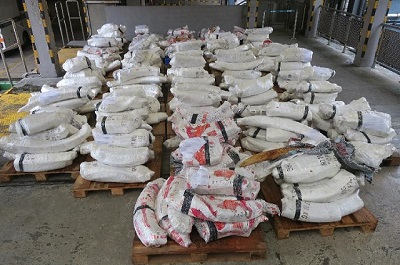Hong Kong Bans Ivory Sales
Hong Kong Legislative Councilors have voted to ban ivory sales in the former epicentre of the global ivory trade. Lawmakers passed the Endangered Species of Animals and Plants (Amendment) Bill 2017, otherwise known as the Hong Kong Ivory Ban Bill on January 31. The local trade will be gradually phased out over the next three and a half years.
 In July last year, authorities in Hong Kong announced what they believed to be the world’s largest ever seizure of about 7.2 tons of tusks. The tusks were found hidden beneath frozen fish cartons in a shipping container which arrived from Malaysia.
In July last year, authorities in Hong Kong announced what they believed to be the world’s largest ever seizure of about 7.2 tons of tusks. The tusks were found hidden beneath frozen fish cartons in a shipping container which arrived from Malaysia.
CITES recognizes that seizures of 500 kilograms or more are generally considered to be indicative of the involvement of organized crime. Overall, close to 40 tons of ivory was seized globally during 2016. Shipments by sea dropped from 70 percent to 44 percent, but containerized sea freight still predominates for moving large-scale shipments of ivory.
The vote in Hong Kong comes just one month after China shut down all commercial processing and sales of ivory at the end of 2017. Since China's ban was announced by President Xi Jinping in September 2015, ivory prices in Hong Kong have dropped precipitously. From a high of $2,100 per kilogram in 2014, the price has now dropped to $766 per kilogram of ivory with paperwork, or $383 per kilogram for black market smuggled ivory from recently-killed elephants.
"Today is a great day for elephants. Hong Kong has always been the 'heart of darkness' of the ivory trade with a 670 ton stockpile when international trade was banned in 1989," said WildAid Hong Kong Campaigner Alex Hofford.
Japan is now the largest open market for ivory with a nominal system of regulation. Thailand has severely restricted trade and is considering a ban. While the rate of illegal killing of African elephants still remains high, as prices fall, laundering opportunities are eliminated and ivory is no longer openly on sale, it is widely expected that poaching will decline.

that matters most
Get the latest maritime news delivered to your inbox daily.
Erik Solheim, Executive Director of the United Nations Environment Programme said, "The fate of elephants still hangs in the balance. We now need to see all other countries close loopholes that still allow the illegal trade of ivory to continue. Governments, civil society, private sector and consumers all have a critical role to play if we are to secure a future with these magnificent creatures."
The global illegal wildlife trade is valued at between $5-20 billion per year. It is the fourth most lucrative global crime after drugs, humans and arms trafficking.
